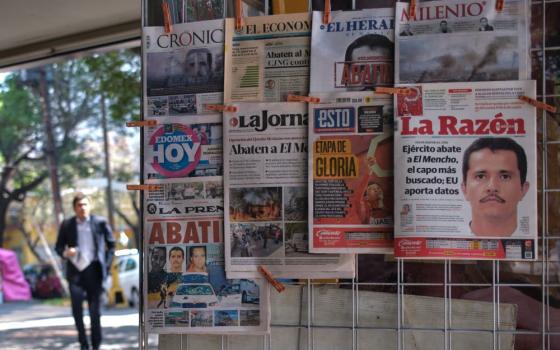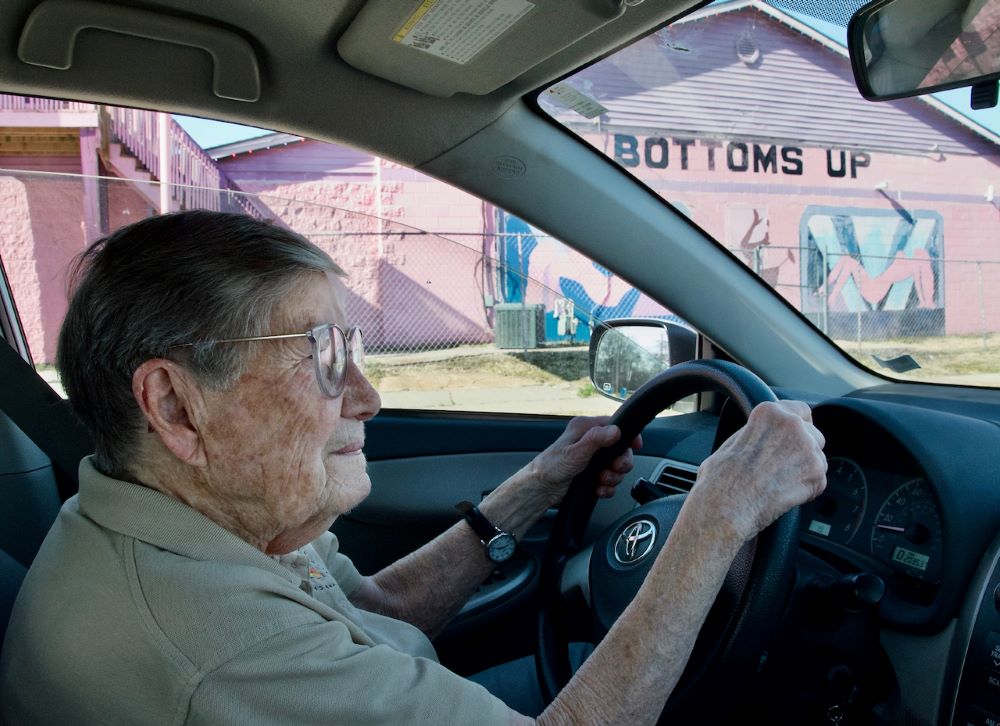
Sr. Julia Huiskamp drives past Bottoms Up, one of the four strip clubs in Brooklyn, Illinois. The strip clubs, a 24-hour massage parlor and a liquor store are the only businesses in the little town across the river from St. Louis. (GSR photo/Dan Stockman)
It's a sunny spring day, and a boy of about 11 has come into the Thomas Terry Community Center looking for his mother.
Sr. Julia Huiskamp, a Daughter of Charity, asks if he knows her phone number. When he says he does not, she says she'll look it up for him.
It's just one of the myriad ways Huiskamp's presence makes the Thomas Terry Apartments, an affordable housing development on the edge of the little Illinois town, a better place to live.
"We're kind of a neighborhood practice here," Huiskamp explains. "Anybody that walks in we try to help."
In her years of ministering in the region, Huiskamp learned the children there didn't need things like tutoring, as much as they needed healing for the trauma that comes with being raised in deep poverty.
"Are the lights going to be on when I go home? Will there be food in the ice box? Did my brother get shot? Is my dad in jail? Is mom home? All of this is very traumatic," she said. "I realized we need a safe place for kids, a place where they're known and cared for."
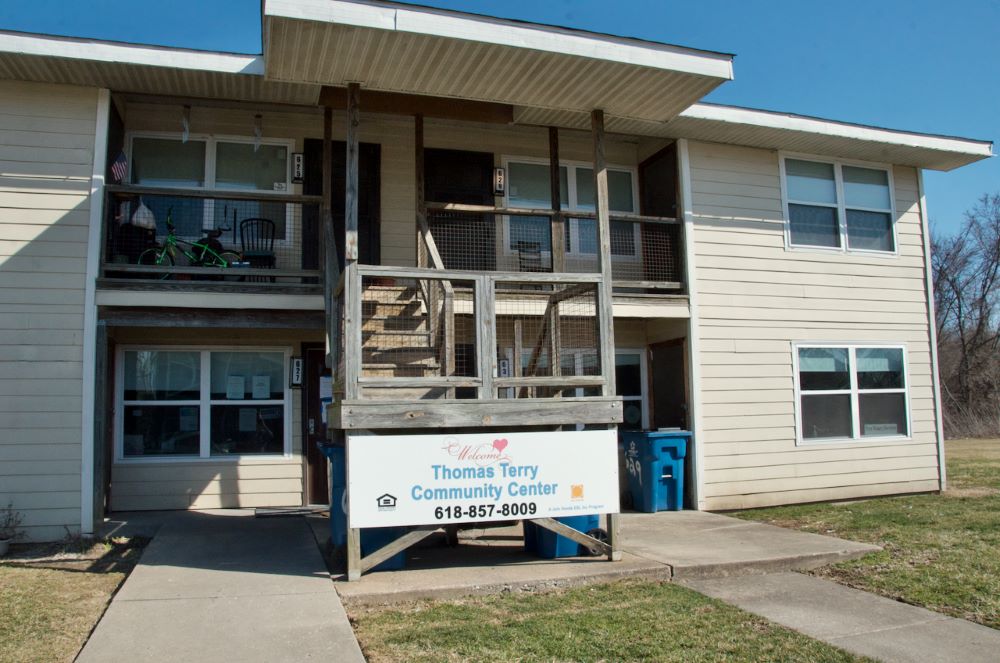
The Thomas Terry Community Center is a ministry Sr. Julia Huiskamp runs to serve the residents of the Thomas Terry affordable housing complex in Brooklyn, Illinois. (GSR photo/Dan Stockman)
Her help is badly needed in Brooklyn. Though the village, also known as Lovejoy, of about 650 people has a storied past — it is the oldest majority-Black incorporated town in the United States, founded in 1829 by freed and fugitive slaves — its future is so bleak the historic preservation nonprofit Landmarks Illinois in 2023 added the town to its list of the state's most endangered historic places. A January story in the Belleville News-Democrat about the town's struggles and revitalization efforts said the town is "dying."
Its median household income of $37,656 is less than half the amount of that in the state of Illinois, while its 35% poverty rate is more than triple that of Illinois, according to U.S. Census figures; 70% of its housing units are worth less than $50,000.
"It's a very isolated community," Huiskamp said. "There's no grocery store, no dollar store. The only thing there is two big strip clubs."
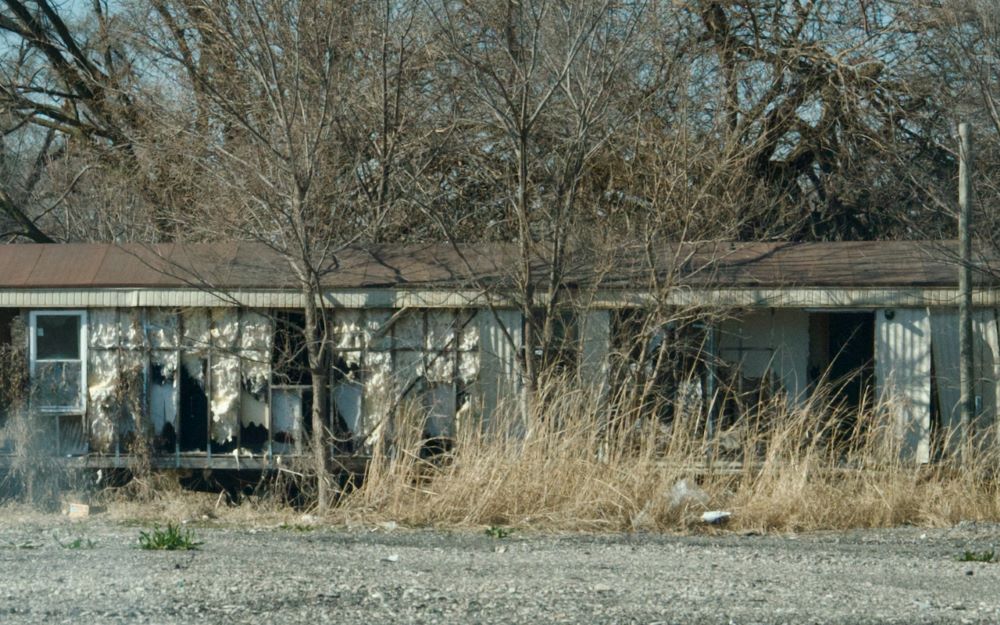
One of the many wrecked and abandoned houses in the struggling town of Brooklyn, Illinois (GSR photo/Dan Stockman)
The number of strip clubs fluctuates, as they seem to be constantly closing down and reopening. One, called Bottoms Up, is painted garish pink and covers half a city block. The only other businesses are a small liquor store and a 24-hour massage parlor. The part of City Hall that houses the fire department was condemned in 2024 because of a collapsed roof; the city not only doesn't have the funds to fix it, but couldn't even pay the OSHA fines for the workplace safety violations the collapse caused.
Brooklyn sits just north of East St. Louis, Illinois, and right across the Mississippi River from St. Louis, Missouri. The area once prospered with industry, but much of that industry left decades ago. Much of what remains seems to be the kind no one wants, like vast railyards, chemical companies, and coal and oil terminals. An area newspaper found that railroad companies now own about 60% of the town's acreage.
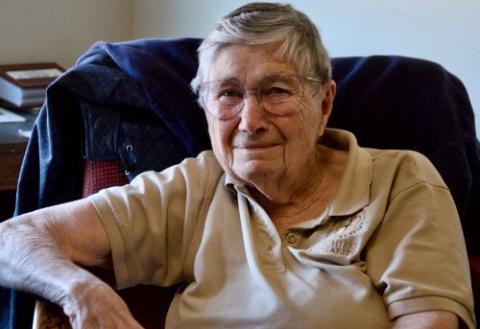
Sr. Julia Huiskamp sits in the Thomas Terry Community Center in Brooklyn, Illinois. (GSR photo/Dan Stockman)
But there are at least 10 churches and, of course, there is Huiskamp, who recently turned 90 but has yet to retire. Her congregation first sent her to East St. Louis in 1985, after 18 years of ministering on the west side of Chicago. Soon after arriving, she founded Griffin Center, a community center that offers summer camps and after-school programs for kids. In 2021 she was a Lumen Christi Award finalist: Her Catholic Extension Society profile called her "The guardian angel of East St. Louis."
In 2023, she went to Brooklyn, where the new affordable housing development offered her two apartments to use for her ministry. From there, Huiskamp provides immeasurable support for the residents, including driving them to the doctor, pharmacy or laundromat, helping them fill out government forms or understand letters written in legalese. Most residents qualify for the state's low-income energy assistance program, which helps them pay their utility bills, but the paperwork is formidable. Huiskamp is happy to help.
"Most people here are living right on the edge," she said. "They miss a few days' work or a child gets sick, it's a mini disaster."
Because they're on the edge, Huiskamp said, there are few, if any, alternatives when things go wrong.
"These people don't have savings," she said. "And all their relatives are in the same boat they are."
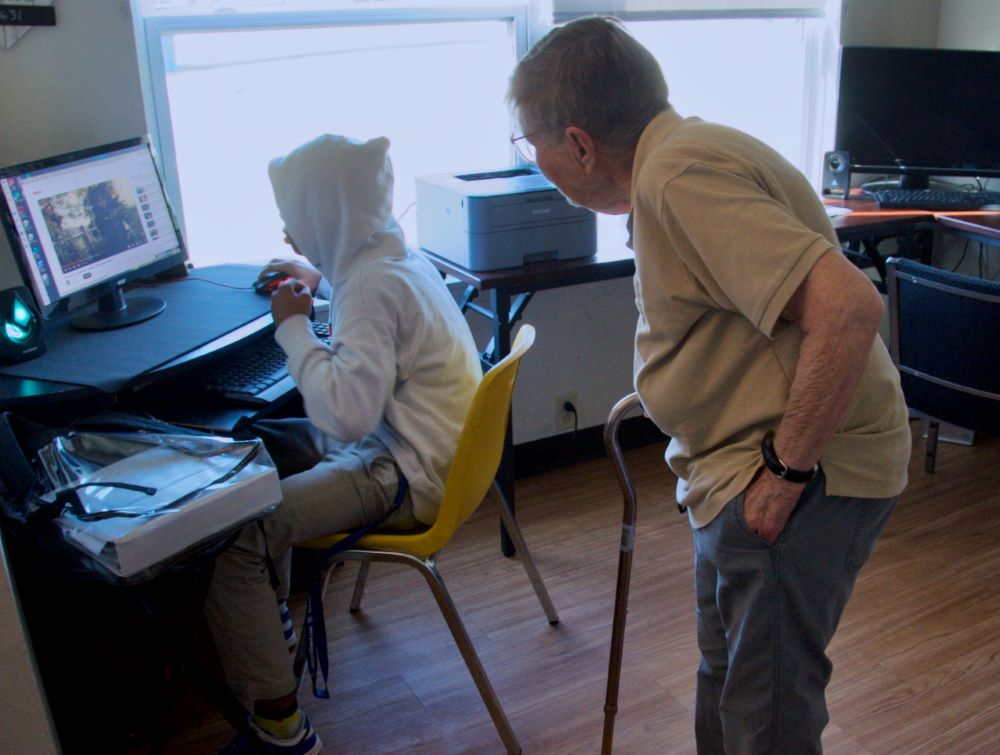
Sr. Julia Huiskamp helps a student use the computer in the Thomas Terry Community Center, a ministry Huiskamp runs to serve the residents of an affordable housing complex in Brooklyn, Illinois. (GSR photo/Dan Stockman)
Daughter of Charity Sr. Mary Walz has been helping out at the community center, and Huiskamp said a situation Walz recently dealt with is typical of the issues residents often face: A brother and sister were sharing an apartment, but after a hospitalization, the brother was in a nursing home. Their rental assistance, however, was based on both of them living in the apartment, and since the brother wasn't there the assistance was cut in half, leaving the sister with no way to pay the rent. Walz was able to help with the paperwork to solve the problem.
Transportation is often a challenge for people living in poverty, but it is compounded in Brooklyn, because there are no services there — no health clinics, no pharmacy, no repair company, nowhere to shop. Anything you might need requires driving — or getting a ride — elsewhere.
"There's no services here, that's the whole problem," Huiskamp said. "It's like a little desert island, even though it's right across the river from St. Louis."
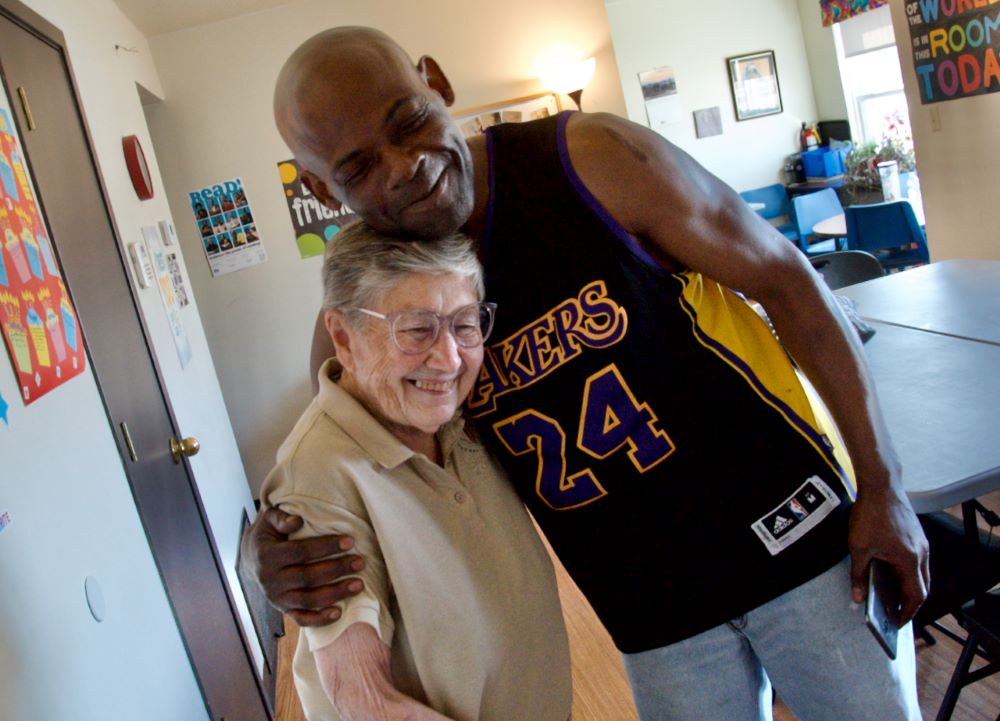
Sr. Julia Huiskamp gets a hug from Brooklyn, Illinois, resident Mike Devine, in the Thomas Terry Community Center, a ministry Huiskamp runs to serve the residents of an affordable housing complex. (GSR photo/Dan Stockman)
Vera Banks was mayor of Brooklyn for 12 years until she left office in April. Though Huiskamp has only been in Brooklyn for two years, Banks has known her for ages — it seems almost everyone on the east side of the river knows her.
"She's a wonderful person and I just love her," Banks said. "She's done so much work for the children in Brooklyn."
Banks said Huiskamp seems to understand what people need, even if the results of her work are not always measurable, like arranging for anger management classes for parents having disputes with school officials.
"We need her. The children need her," Banks said. "She has a servant's heart."
Advertisement
Last October, the people of Brooklyn made a big push for a revitalization effort. But grants they were hoping to receive haven't come through, and with the Trump administration cutting programs at the federal level, it doesn't look like they will, Banks said. Huiskamp fears the people she serves will be hurt the worst by the cuts.
"I'm worried about public housing and [rental assistance], food stamps and Medicaid — stuff people really depend on," Huiskamp said. "You just hope you can help a little bit, help people get a little more self-sufficient."
Banks said if the town had a dozen Sister Julias, "We'd be unstoppable," but Huiskamp knows she has limits.
"I hope I can find someone to continue this. I'm getting pretty old," Huiskamp said. "It's the kind of work Jesus had in mind in Matthew 25," where Jesus tells his followers to feed the hungry, care for the stranger, clothe the naked, and heal the sick.
"I did a lot of administrative stuff when I was younger," she said, "but this is definitely more fun."





